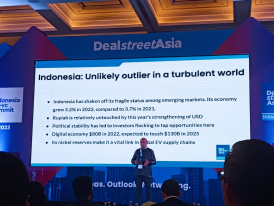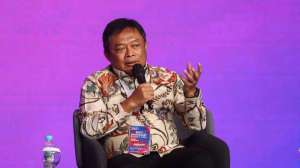Robust market, improvement are fundamentals for investment: Northstar's Patrick Walujo
Northstar’s Co-founder and Managing Partner Patrick Walujo said private equity (PE) companies would need to focus on fundamentals to grab early-stage opportunities in Indonesia due to its vast favorable demographics and macroeconomics indicators as well as robust market.
Established in 2003, Northstar Group is a PE firm investing in start-up companies in Indonesia and other Southeast Asian countries. The company has been doing early-stage investments for the past seven years and has the experience in the sector. Its investment includes its early backer to ride hailing apps Gojek, Greenfields, Up Gen and Indomaret.
It has managed more than US$ 2.5 billion in equity capital in Southeast Asia. The company managed over five private equity funds and invested in over 35 companies on banking, insurance, consumer/ retail, manufacturing, technology, telecom and agribusiness sectors.
Northstar has also invested over US$ 3.3 billion in co-investors in the region. The company's core focus is consumer internet, financial technology and enterprise software, and mainly targets startups in Indonesia, and other countries in Southeast Asia.
Companies should focus on fundamentals of investing
Northstar has invested in more than 50 digital deals such as in crypto exchange Pintu, podcast platform Noice, agritech Sayurbox and edtech Zenius Education. The company is seeking what is next for Indonesia would be good for investors.
In the past three years, the performance of businesses in Indonesia has been expected to improve since the recent crash in valuations of high-growth companies, Walujo told the audience during the Indonesia PE-VC Summit held by Dealstreet Asia in Jakarta on January 12, 2023.
There have been forecasts on possible recessions, inflations and economic disturbances in Indonesia, which would lead the country to an unprofitable situation due to political instability.
"The business environment in Indonesia, generally speaking, is very strong. The government has done a good job in the past seven years to create an environment that is healthy for businesses," said Walujo.
“The metrics or KPIs [key performance indicators] for companies generally have done a lot better. So there is a two-dimensional thing. Valuation has gone down. But the business performance continues to improve, And I expect that to continue this year,” he added.
With the ongoing situation in the market, companies should focus on the fundamentals and basics to ensure that would continue better and reduce costs along the way, Waluyo explained.
"The market is still going to be robust. I do not see any reason to be exceedingly worried in the near term," he said.
Walujo also stated that the exiting Southeast Asia might remain a challenge for VC investors. Yet, he was not worried because even in difficult times investors still exited.
"If you are invested in a good business, it is easy to make an exit; if you run a bad business, it is terribly difficult to find an exit route," he concluded.
Risks of investing in PE and VC
However, there are risks in PE and VC (venture capital) investment. Liquidity risk exists since investors are expected to invest for several years. Market risk is omnipresent because companies that were invested are unproven, which leads to losses if they fail to succeed.
In VC, the risk is that the company would not be able to pull off a good exit strategy. The company may not be able to pull off enough revenue to offer to the public or sell its shares. Smaller companies that look for a big buyer may not be successful to make the grade, making the VCs stuck.
Already have an account? Sign In
-
Start reading
Freemium
-
Monthly Subscription
30% OFF$26.03
$37.19/MonthCancel anytime
This offer is open to all new subscribers!
Subscribe now -
Yearly Subscription
33% OFF$228.13
$340.5/YearCancel anytime
This offer is open to all new subscribers!
Subscribe now






